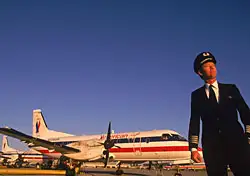
If there were a Commercial Aviation Hall of Fame, Robert Crandall would be one of its first inductees.
Crandall worked at American from 1973 and led the airline from 1980 until his retirement in 1998. During his tenure, which included the years of deregulation, American was the airline industry’s leading innovator, credited with such key developments as the first modern frequent flyer program (AAdvantage, 1981), hub-and-spoke route networks, advance-purchase fares, and computerized yield management.
So if air travel today can be said to bear the imprint of any single individual, that individual would have to be Robert Crandall.
In a rare op-ed column in yesterday’s New York Times, Crandall weighed in on the current state of the industry he did so much to shape. His overall assessment is a bleak one: “Our airlines, once world leaders, are now laggards in every category, including fleet age, service quality and international reputation.”
On the subject of mergers, Crandall is a naysayer. Addressing both the [% 2550074 | | Delta-Northwest merger %] currently in process, and other tie-ups expected to follow, his take is altogether negative: “Mergers will not lower fuel prices. They will not increase economies of scale for already sizable major airlines. They will create very large costs related to consolidation. And they will anger airline employees, who will perceive themselves to be hurt by the mergers.”
Predictably, Crandall is skeptical of the current wave of sentiment favoring an increase in airline regulation. But he recognizes the limitations of a completely unregulated approach as well: “Market-based approaches alone have not and will not produce the aviation system our country needs.”
For example, until a new air traffic control system can be put into place, the government should restrict the number of flights allowed at more crowded airports, because the airlines have proven themselves incapable of exercising self-restraint.
Crandall would like to see stricter financial standards imposed on start-up airlines, to force them to operate within the bounds of financial rationality. The culprit, which he alleges leads to artificially low prices, is the trend of “inadequately financed carriers—whose principal goal has often seemed to be merely to exist long enough to reap the rewards of an initial public offering.”
The former airline chief also calls for revised bankruptcy laws, “to prevent failed airlines from continuing to operate,” and for the imposition of binding arbitration in labor disputes. Both measures would help force labor and management into working more cooperatively.
Crandall ends with a prediction: Whether the industry consolidates or not, consumers will pay more for their airline tickets. But, he continues, “We will be better off with higher fares and more competitors than with higher fares and fewer competitors.”
We hand-pick everything we recommend and select items through testing and reviews. Some products are sent to us free of charge with no incentive to offer a favorable review. We offer our unbiased opinions and do not accept compensation to review products. All items are in stock and prices are accurate at the time of publication. If you buy something through our links, we may earn a commission.
Related
Top Fares From
Today's Top Travel Deals
Brought to you by ShermansTravel
Kenya: 14-Night Tour, Incl. Tanzania &...
smarTours
 vacation
$7125+
vacation
$7125+
7-Night Caribbean Round-Trip Cruise From Orlando:...
Norwegian Cruise Line
 cruise
$739+
cruise
$739+
Ohio: Daily Car Rentals from Cincinnati
85OFF.com
 Car Rental
$19+
Car Rental
$19+



